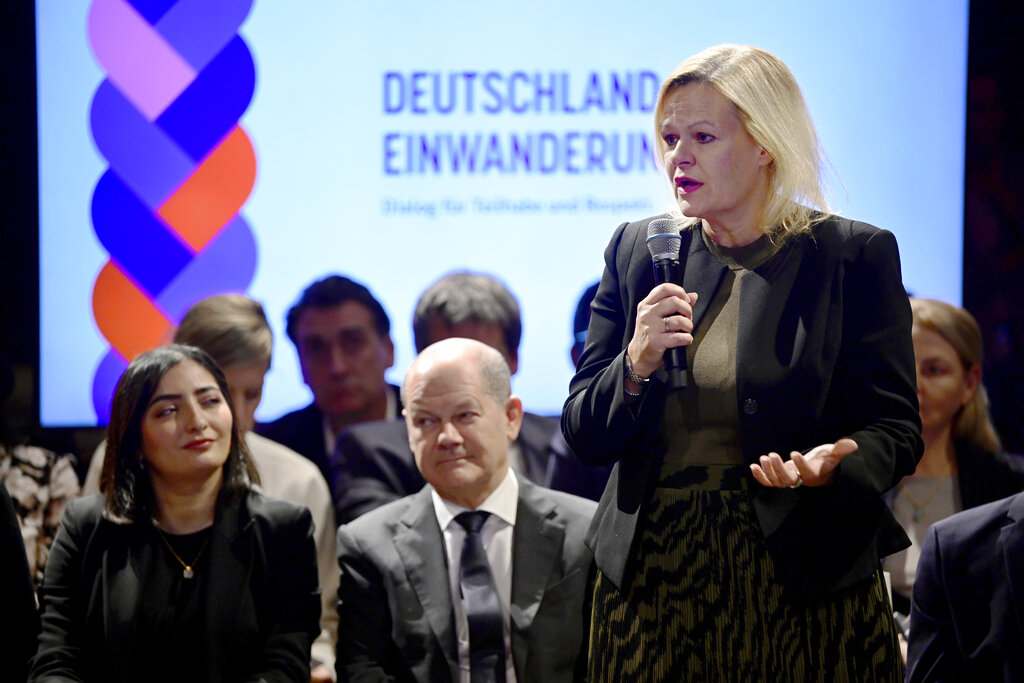While Germany is discussing easier naturalization for foreign nationals, the new center-right government in Sweden, propped up by the right-wing Sweden Democrats, is planning to make citizenship subject to stricter rules.
“Germany has become a country that is the land of hope for many,” German Chancellor Olaf Scholz said in a video message a few days ago, advocating reform of citizenship laws. Germany needs “better regulations,” the chancellor said, supporting the agenda of the traffic light coalition and SPD Interior Minister Nancy Faeser. The SPD, Greens, and FDP pledged in their coalition agreement to ease the process for foreign nationals residing in Germany to attain German citizenship.
The message of the traffic light coalition is clear: Immigration policy is to be realigned, and Germany is to become even more welcoming to mass migration. The Interior Ministry’s draft law stipulates that in the future, people will be able to apply for citizenship after just five years instead of the previous eight; in the case of “special integration achievements,” such as good language skills or academic and professional success, this will even be possible after just three years. The proposal has been criticized not only by the opposition but also one coalition partner, FDP.
In contrast, the strategy in Scandinavia has developed quite differently. Following in the footsteps of Denmark, where the goal of “zero migration” was set years ago and the hurdles for naturalization were raised significantly, Sweden has now also begun to tighten its migration and integration policy considerably. In the country that long maintained the most liberal immigration policy in Europe, those in power have made a U-turn, which was actually initiated under the previous leadership of SPD’s Social Democratic sister party.
With the new conservative coalition government, in which Sweden’s right-wing nationalists will have considerable influence for the first time, this trend is likely to intensify. Two months after the election, there are increasing signs of this.
The change began in 2015, when more than 160,000 people arrived in Sweden in the wake of the migration crisis, resulting in the country welcoming more people per capita than any other European country. The Social Democratic government pulled the emergency brake and tightened asylum laws for the first time.
Stockholm also abolished the indefinite right to stay after three decades and last summer turned the temporary solution into a legally established one. The right-wing nationalist Sweden Democrats had called for even stricter rules, including for Swedish citizenship.
Although Sweden still naturalizes the most foreign nationals in Europe relative to its population, a declaration of intent by the new coalition government indicates that, following the turnaround in migration policy, new conditions could soon apply to citizenship as well.
In mid-October, the new coalition partners laid the foundation for their future cooperation in the so-called Tidö Agreement, named after the castle in which the parties agreed on several common goals. The topics of migration and integration play a central role in this agreement.
For example, the parties of the right-wing bloc agreed to set up a new government commission “to work out further stricter requirements for acquiring Swedish citizenship.” It is to “investigate and propose” whether, in the future, citizenship can only be applied for after a period of residence of at least eight years.
It is difficult to predict what the coalition will be able to agree upon over the next four years, but it is already apparent that the right-wing bloc is united on several fronts, all pointing in one direction: turning away from Sweden’s long-held tradition of a liberal immigration policy.





